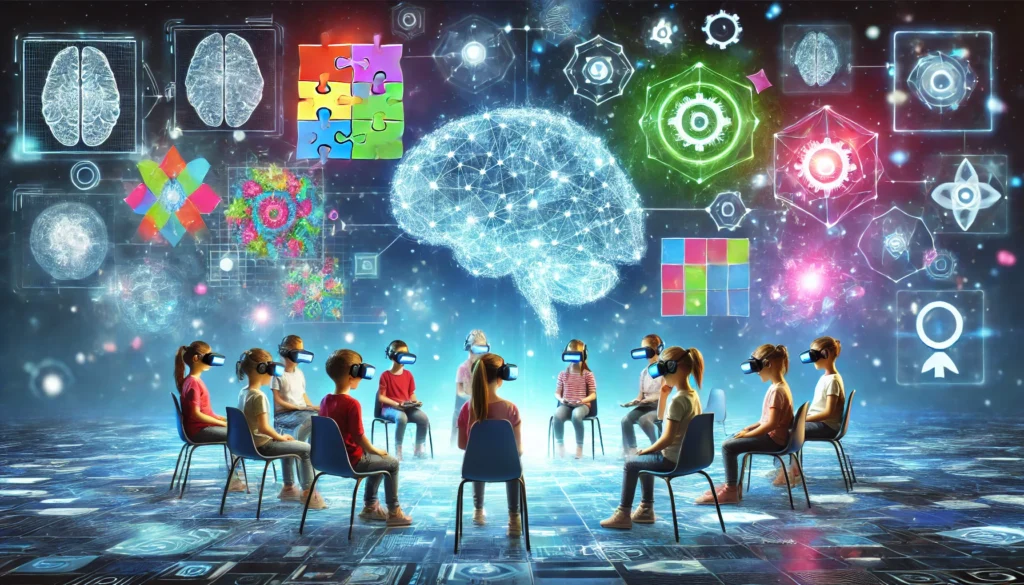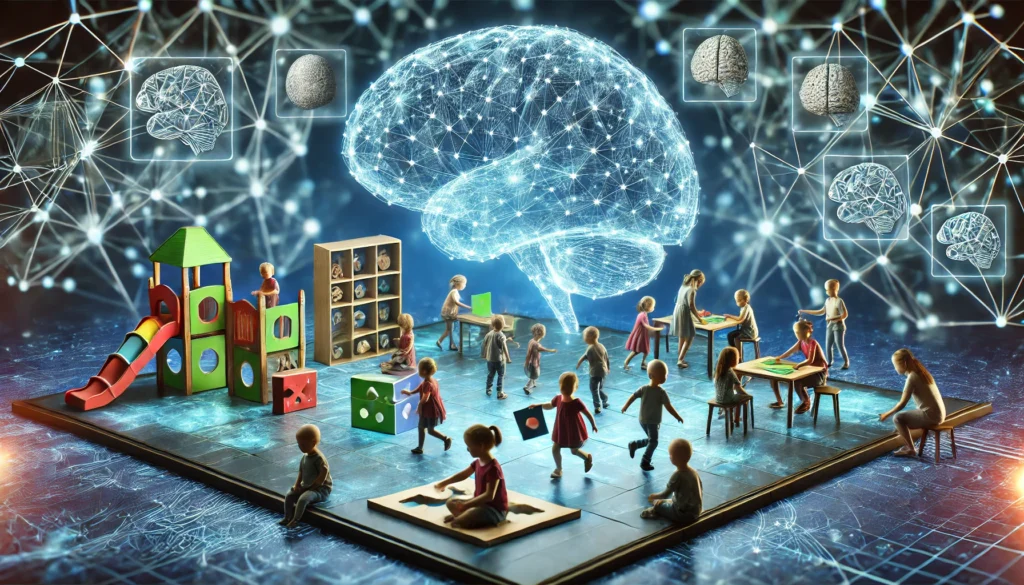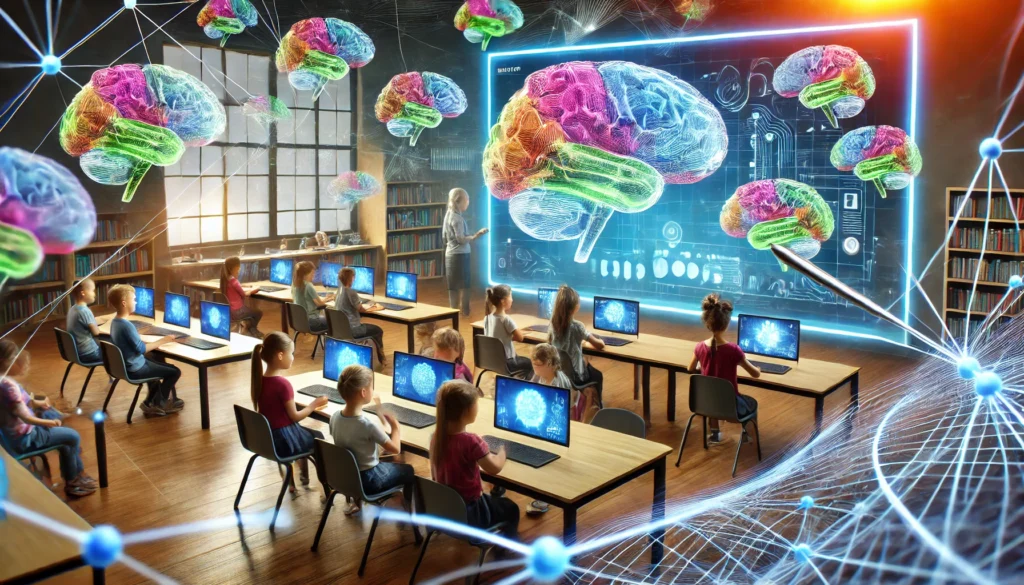Cognitive development in children is a dynamic process influenced by various factors, including education, environment, and mental stimulation. Memory plays a crucial role in this process, serving as the foundation for learning and problem-solving skills. With the rapid expansion of digital education, online memory games for kids have emerged as a valuable tool for enhancing cognitive functions. These interactive games offer children engaging and scientifically designed challenges that strengthen memory recall, improve concentration, and build problem-solving skills. By incorporating well-structured kids memory games into a child’s routine, parents and educators can create an enjoyable yet effective cognitive training environment that fosters long-term mental growth.
You may also like: “Boost Your Memory & Recall: The Best Brain Training for Neural Pathway Strengthening”
Understanding the Role of Memory in Cognitive Development
Memory is an essential component of cognitive development, acting as the mechanism through which children absorb, process, and retrieve information. It enables them to recognize patterns, retain knowledge, and apply learned concepts in different scenarios. The capacity for memory development varies among children and is influenced by factors such as genetics, environment, and educational exposure. Strengthening memory at an early age not only aids in academic performance but also contributes to problem-solving abilities and critical thinking skills. Interactive activities such as kids memory games provide an engaging platform to reinforce these cognitive processes while keeping young minds actively engaged.
Neuroscientific research supports the notion that memory training exercises stimulate neural connections, improving the efficiency of information retention. When children participate in online memory games for kids, their brains undergo adaptive changes that enhance cognitive flexibility and mental resilience. These games often involve tasks such as matching patterns, recalling sequences, and solving puzzles, which actively stimulate different areas of the brain. By engaging in such mentally stimulating activities regularly, children develop stronger neural pathways that support overall cognitive function, including improved focus and analytical skills.

The Benefits of Online Memory Games for Kids
The increasing reliance on digital technology in education has made online memory games for kids a convenient and effective tool for learning. These games offer multiple benefits that contribute to a child’s cognitive, emotional, and social development. One of the primary advantages is their ability to make learning enjoyable. Traditional memorization techniques can often feel repetitive and disengaging for children, but interactive memory games transform cognitive training into an exciting and rewarding experience.
Additionally, memory games improve attention span and concentration. Many kids memory games require players to focus on recalling details, following sequences, or solving problems within a limited time frame. This process helps children develop sustained attention, an essential skill that translates into improved academic performance and better overall cognitive endurance. Furthermore, these games often incorporate elements of problem-solving, critical thinking, and strategic planning, further enhancing the child’s ability to process information efficiently.
Another significant benefit of online memory games for kids is their accessibility. Unlike traditional educational resources that may be limited to physical books or classroom settings, digital memory games can be accessed anytime and anywhere. This flexibility allows children to engage in cognitive training outside of school hours, reinforcing memory development through continuous practice. Parents can integrate these games into their child’s daily routine, ensuring that cognitive exercises become a consistent and beneficial habit.
The Science Behind Memory Games and Neural Pathway Strengthening
Neural plasticity, or the brain’s ability to reorganize itself in response to learning and experience, is a fundamental concept in cognitive development. Kids memory games leverage this principle by providing structured activities that challenge the brain to form and strengthen new neural pathways. Each time a child engages in a memory game, the brain adapts by creating stronger connections between neurons, leading to improved retention and faster recall of information.
Scientific studies suggest that interactive memory exercises stimulate various regions of the brain, including the prefrontal cortex and the hippocampus, which are crucial for working memory and long-term retention. By participating in online memory games for kids, children enhance their ability to process and retrieve information efficiently. This type of cognitive training is particularly beneficial for young learners, as it helps establish a strong foundation for future academic achievements and lifelong learning capabilities.
Moreover, memory games support cognitive flexibility—the ability to switch between different tasks and adapt to new information. Many digital memory games present challenges that require players to adjust their strategies dynamically, reinforcing mental adaptability. As children engage in increasingly complex memory tasks, they develop problem-solving skills that extend beyond gaming and into real-life scenarios. This adaptability is particularly valuable in academic settings, where students must quickly grasp new concepts and apply them to different contexts.

Frequently Asked Questions (FAQ) on Online Memory Games for Kids
1. How do online memory games for kids enhance cognitive flexibility? Online memory games for kids are designed to challenge a child’s ability to think dynamically and adapt to new patterns. Unlike traditional memorization techniques, these games require children to recognize sequences, recall information, and adjust strategies in real time. By playing regularly, children improve their ability to switch between different tasks efficiently, reinforcing cognitive flexibility. This skill is critical for academic success, as students must frequently apply knowledge across different subjects and problem-solving situations. Memory games foster adaptability by presenting new challenges each session, encouraging children to approach problems from multiple perspectives.
2. Are kids memory games effective for improving long-term memory retention? Yes, kids memory games are an effective tool for strengthening long-term memory by reinforcing neural connections. When children repeatedly engage in structured memory exercises, their brains create stronger associations, making recall easier over time. Unlike rote learning, which often leads to passive memorization, interactive games require active participation, ensuring that information is deeply embedded in memory. Studies in cognitive psychology suggest that repeated exposure to complex problem-solving tasks enhances a child’s ability to store and retrieve information efficiently. As a result, children who engage in memory games develop stronger memory recall abilities, which benefit them academically and in everyday life.
3. How do online memory games for kids contribute to emotional development? Beyond cognitive benefits, online memory games for kids play a crucial role in emotional regulation and resilience. Many of these games involve challenges that require patience, persistence, and problem-solving under pressure. As children navigate these challenges, they develop frustration tolerance and learn how to cope with setbacks in a healthy manner. Moreover, the rewarding nature of completing levels or earning points fosters a sense of accomplishment and self-confidence. Over time, children gain a positive attitude toward learning and perseverance, skills that extend to other aspects of their academic and personal lives.
4. Can kids memory games help children with learning difficulties? Yes, memory games can be particularly beneficial for children with learning difficulties by providing structured, engaging, and repetitive exercises that reinforce cognitive skills. Many online memory games for kids include customizable difficulty levels, allowing children to progress at their own pace while building confidence. These games also engage multiple sensory inputs—such as visual, auditory, and spatial memory—which can help children with different learning styles absorb and retain information. Furthermore, memory games often incorporate adaptive feedback mechanisms, offering guidance and corrections in a non-intimidating way. As a result, children with learning difficulties may experience improved concentration, better memory recall, and greater motivation to engage with learning tasks.
5. What role do online memory games play in strengthening executive function skills? Executive function skills, including problem-solving, impulse control, and cognitive flexibility, are essential for childhood development. Online memory games for kids provide an environment where these skills are continuously challenged and refined. For example, many memory games require children to follow multi-step instructions, recall patterns, and adjust their responses based on new information. These cognitive demands strengthen the prefrontal cortex, the brain region responsible for executive functions. As children engage in memory-based challenges, they enhance their ability to plan, focus, and regulate their thought processes, which benefits both academic performance and social interactions.
6. How do kids memory games compare to traditional memory-enhancing activities? Kids memory games offer a level of engagement and interactivity that traditional memory-enhancing activities, such as flashcards or rote memorization, may lack. Unlike passive learning methods, digital memory games require real-time decision-making, reinforcing active cognitive engagement. Additionally, memory games often incorporate gamification elements—such as rewards, progression tracking, and interactive storytelling—that keep children motivated and entertained. This increased level of engagement translates to more consistent practice and better overall memory retention. While traditional methods still have value, incorporating memory games into a child’s routine provides a dynamic and effective way to strengthen cognitive abilities.
7. What are some unexpected benefits of playing online memory games for kids? Aside from cognitive improvement, online memory games for kids provide benefits that extend to social and motor skill development. Many multiplayer memory games encourage teamwork, collaboration, and healthy competition, helping children develop social intelligence. Some games also require precise hand-eye coordination, improving fine motor skills and reaction times. Additionally, memory games expose children to problem-solving under timed conditions, fostering decision-making abilities and confidence under pressure. These benefits make memory games a well-rounded tool for enhancing both cognitive and social-emotional development. Over time, children who engage with memory games may find that their ability to focus, adapt, and strategize improves across various areas of life.
8. How frequently should children play memory games for optimal results? For the best cognitive benefits, children should engage with memory games regularly but in moderation. Experts recommend playing kids memory games for at least 20 to 30 minutes per session, around three to five times per week. Consistent exposure to memory challenges strengthens neural pathways without leading to cognitive fatigue. Parents should also ensure a balance between screen time and offline activities to maintain holistic brain development. By maintaining a structured yet flexible schedule, children can enjoy the cognitive advantages of memory games while preserving a well-rounded learning experience.
9. Can online memory games for kids aid in language acquisition? Yes, many online memory games for kids incorporate language-based activities that enhance vocabulary retention and linguistic skills. Memory games that focus on word associations, spelling patterns, and storytelling sequences help reinforce language learning in an engaging way. These games provide repeated exposure to new words and concepts, allowing children to develop stronger linguistic recall. Additionally, multilingual memory games support bilingual education by providing interactive ways to learn new languages. By combining memory training with language acquisition, children can improve both their cognitive flexibility and communication abilities.
10. What should parents look for when choosing kids memory games? When selecting kids memory games, parents should prioritize games that are age-appropriate, scientifically designed, and offer progressively challenging levels. Games that provide adaptive difficulty settings ensure that children remain engaged while gradually improving their memory skills. Additionally, educational games that incorporate elements of storytelling, problem-solving, and social interaction offer a more enriching learning experience. Parents should also consider games with progress-tracking features, which allow children to see their improvement over time and stay motivated. By selecting well-structured and research-backed memory games, parents can ensure their children receive the maximum cognitive benefits from their gameplay.

Conclusion: The Lasting Impact of Memory Games on Cognitive Growth
Incorporating online memory games for kids into a child’s educational experience offers substantial cognitive benefits that extend beyond simple memory recall. These interactive games provide an engaging and effective method for strengthening neural pathways, improving concentration, and enhancing problem-solving abilities. With their accessibility, adaptability, and scientifically backed benefits, memory games serve as a powerful tool for cognitive development, preparing children for academic success and lifelong learning.
As digital education continues to evolve, the role of kids memory games in enhancing cognitive function will likely become even more significant. By leveraging these tools to create a stimulating and enriching learning environment, parents and educators can empower children with the mental agility and cognitive resilience needed to excel in an increasingly complex world. With consistent engagement in memory-based activities, young learners can develop the skills necessary for academic achievement, creative problem-solving, and intellectual curiosity that will serve them well into adulthood.
Further Reading:
10 Brain Games and Other Activities That Boost Memory
Top 10 Memory Games for Kids: Fun Ways to Boost Cognitive Skills
Top 5 games for boosting your child’s cognitive skills
Important Note: The information contained in this article is for general informational purposes only, and should not be construed as health or medical advice, nor is it intended to diagnose, prevent, treat, or cure any disease or health condition. Before embarking on any diet, fitness regimen, or program of nutritional supplementation, it is advisable to consult your healthcare professional in order to determine its safety and probable efficacy in terms of your individual state of health.
Regarding Nutritional Supplements Or Other Non-Prescription Health Products: If any nutritional supplements or other non-prescription health products are mentioned in the foregoing article, any claims or statements made about them have not been evaluated by the U.S. Food and Drug Administration, and such nutritional supplements or other health products are not intended to diagnose, treat, cure, or prevent any disease.


